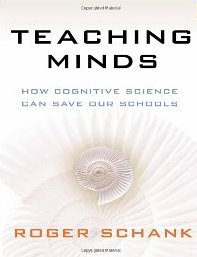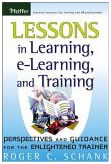Thought Leadership
Featured Item
The premise of Roger Schank’s book, Teaching Minds: How Cognitive Science Can Save Our Schools, is simple. We have all gone to school. We all know that school is organized around academic subjects like math, English, history and science. But how else might school be organized? There is an easy answer to this: organize school around thought processes.
News & Publications
News & New Projects
Socratic Arts is partnering with the BES at La Salle University to provide online, Story-Centered Curriculum advanced degree programs in a variety of fields, such as Business, eBusiness, and Learning Sciences. For more information, visit the Socratic Arts BES La Salle homepage or watch the Cognitive Processes that Underlie Learning lecture that Roger Schank gave at La Salle University.
Alternative Learning Places
We're proposing to re-design and replace school with what we are calling Alternative Learning Places (ALP). What will the alternative look like? Kids working in teams on projects that they're interested in, with goals they care about (building a robot that does something, building a toothpick bridge that can hold weight, building a car that will win a race, telling another kid about where they live, forming a friendship with a kid in another country…) Kids practicing the skills they need for lifelong success in the real world- such as teamwork, goal conflict resolution, judgment, persuasion, management, and communication. The Alternative Learning Places will give parents and their children an alternative to our broken education system. Visit the Alternative Learning Places website for more information, or review the Alternative Learning Place brochure (PDF) for more information on our Engineering curriculum for 5-6 year olds.
Books
Teaching Minds: How Cognitive Science can Save Our Schools
By Roger C. Schank, October 2011
Roger Schank new book about re-thinking education. We have all gone to school. We all know that school is organized around academic subjects like math, English, history, and science. This book asks why?
How else might school be organized? There is an easy answer to this: organize school around thought processes. In 1892, when the American high school was designed, we didn’t know much about thought processes. Now we do. It is time to re-think school.
Order Teaching Minds from Amazon in paperback.
Get the eBook version of Teaching Minds from Google Books.
Lessons in Learning, e-Learning, and Training: Perspectives and Guidance for the Enlightened Trainer
By Roger C. Schank, 2005
From Roger C. Schank—one of the most highly respected thinkers, writers, and speakers in the training, learning, and e-learning community—comes a compelling book of essays that explore the myriad issues related to challenges faced by today’s instructional designers and trainers. The essays offer a much-needed perspective on what trainers do, why they do it, and how they do it. Lessons in Learning, e-Learning, and Training serves as a barometer to the issues that often perplex trainers and helps to illuminate three main points: what can and cannot be taught; how people think and learn; and what technology can really effectively provide. In addition, each essay is filled with practical guidance and includes a summary of ideas, tips and techniques, things to think about, checklists, and other job aids.
"Stories are the jewels of learning and Roger Schank is the prince of storytelling. This collection of training stories is a must read!"
--Elliott Masie, founder, e-Learning CONSORTIUM
"Learning has become a strategic advantage in business over the last decade, but in trying to ‘optimize’ that advantage we've sterilized the process. In this book, Roger reminds us that teaching and learning can be fun and effective. It's like having a long personal conversation with Roger--it's fun, interesting, and illuminating."
--Tom Kelly, vice president, Cisco
"Roger Schank is a genius, his ideas are insightful, and provocative. His latest book is a must read for those who want to stay at the leading edge."
--Brandon Hall, lead researcher and CEO, Brandon-Hall.com
Tell me a Story
By Roger C. Schank, 1991
Why, when something important happens to you, do you feel compelled to tell someone about it? “Our interest in telling and hearing stories is strongly related to the nature of intelligence,” Schank observes, “Today, we are attempting to build machines that have interesting stories to tell and procedures that enable them to tell these stories at the right time.” In this book, Schank looks closely at the way in which the stories we tell relate to our memory and understanding, and explores some of the remarkable aspects and implications of our ability to recall stories and relate them to new ones we are hearing.
Dynamic Memory Revisited
By Roger C. Schank, 1999
'It is all too often the case that after introducing an influential concept, the originator moves on to a new challenge or new problem, leaving others to test the implications of the conceptualization and otherwise 'tidy up' in its wake. In Dynamic Memory Revisited, Roger Schank bucks this trend. In particular, he addresses a persistent weakness of the script model, and extends the reformulation into the educational arena.'
Book review of Dynamic Memory Revisited
from Human Development
Dynamic Memory Revisited at Amazon
Engines for Education
By Roger C. Schank and Chip Cleary, 1995
Published in hyper-book as well as paper form, this book discusses what's wrong with the education system, how to reform it, and, especially, the role of educational technology in that reform. It describes the progress made at the Institute for the Learning Sciences using computers to provide motivating learning environments that let students learn things by doing them. The hyper-book version (available online) uses a method developed at ILS based on the metaphor of a question-answer conversation.
Read the web version of the hyperbook Engines for Education.
Engines for Education at Amazon
The Connoisseur's Guide to the Mind
By Roger C. Schank, 1991
By showing what we do when we read a menu, select a wine, sample a dish, argue with a waiter, or recall a favorite meal, this fascinating and accessible book illustrates what kinds of mental operations we perform, why we do what we do, and how we remember—in general, what it means to be intelligent. With wit and insight, Schank reveals the importance of stereotypes in learning, the role of stories in explanation, and the relationship of expectations and predictions to understanding.
The Connoisseur's Guide to the Mind at Amazon
More Books by Roger Schank:
Making Minds Less Well Educated than Our Own. Lawrence Erlbaum Associates, Mahwah, NJ, 2004. >> details
Designing World Class e-Learning. McGraw Hill, New York, NY, 2001. >> details
Scrooge Meets Dick and Jane. Lawrence Erlbaum Associates, Mahwah, NJ, 2001. >> details
Coloring Outside the Lines: Raising a Smarter Kid by Breaking All the Rules. HarperCollins, New York, 2000. >> details
Inside Multi-Media Case Based Instruction. Lawrence Erlbaum Associates, Mahwah, NJ, 1998. >> details
Virtual Learning: A Revolutionary Way to Build a Highly Skilled Workforce. McGraw Hill, New York, 1997. >> details
Inside Case-Based Explanation. With A. Kass and C. Riesbeck. Lawrence Erlbaum Associates, Hillsdale, NJ, 1994. >> details
Beliefs, Reasoning, and Decision Making. Edited with E. Langer. Lawrence Erlbaum Associates, Hillsdale, NJ, 1994. >> details
Inside Case-Based Reasoning. With C. Riesbeck, Lawrence Erlbaum Associates, Hillsdale, NJ, 1989. >> details
The Creative Attitude. With P. Childers, Macmillan and Company, New York, NY, 1988. >> details
Explanation Patterns: Understanding Mechanically and Creatively. Lawrence Erlbaum Associates, Hillsdale, NJ, 1986. >> details
The Cognitive Computer: On Language, Learning, and Artificial Intelligence. With P. Childers, Addison-Wesley Publishing Co., Reading, MA, 1984. >> details
Dynamic Memory: A Theory of Learning in Computers and People. Cambridge University Press, Cambridge, England, 1982. >> details
Reading and Understanding: Teaching From an Artificial Intelligence Perspective. Lawrence Erlbaum Associates, Hillsdale, NJ, 1981. >> details
Inside Computer Understanding: Five Programs Plus Miniatures. Co-editor with C. Riesbeck, Lawrence Erlbaum Associates, Hillsdale, NJ, 1981. >> details
Scripts, Plans, Goals and Understanding: An Inquiry Into Human Knowledge Structures. With R. Abelson, Lawrence Erlbaum Associates, Hillsdale, NJ, 1977. >> details
Conceptual Information Processing. North-Holland Press, Amsterdam, 1975. >> details
Proceedings of the Conference on Theoretical Issues in Natural Language Processing. Co-editor with B. Nash-Webber. Distributed by Association for Computational Linguistics, 1975.
Computer Models of Thought and Language. Edited by R. Schank and K. Colby, W. H. Freeman Press, San Francisco, CA, 1973. >> details
A Conceptual Dependency Representation for a Computer-Oriented Semantics. University of Texas, PhD thesis, 1969. >> details
Articles
The Story-Centered Curriculum
The school experience in no way mirrors what student lives will be like after graduation, nor does it take into account any modern theory of how students learn best. The experience is passive, fragmented, unmotivated, and generally dull. And, not surprisingly, it usually does not work. Dropout rates in high school are astoundingly high.
In contrast to a passive, subject-oriented curriculum, a Story-Centered Curriculum (SCC) can be viewed as a carefully designed apprenticeship-style learning experience in which the student encounters a planned sequence of real-world situations constructed to motivate the development and application of knowledge and skills in an integrated fashion.
Full article at eLearn Magazine
"The entire world has learned [algebra] for no reason!"
Roger recently gave a talk at The World Bank titled "How to Think (Education Reconsidered)" where he discussed many of the problems that exist in high school and college, why they exist, and what we can do to fix them.
Video of the talk, complete with the slides, is available at The World Bank's EduRadicals
The Reminding Machine
We have begun to build a just in time advisor based on the unconscious reminding process. We start with story collection in a particular domain of knowledge. Stories are then indexed by hand. When enough stories are collected and indexed, a knowledge base of what smart people know about how to deal with complex situations is available to those who need it. A demo of this is available on request.
Read The Reminding Machine by Roger Schank
More articles:
Educational Outrage: An Occasional Column by Roger Schank
Reminding and E-Learning: An article at eLearn Magazine
Ten Mistakes In Education: School systems are making a great many mistakes; here are Roger Schank's 10 favorites.
White Papers
Story-Centered Curriculum white paper: (44k PDF) Socratic Arts white paper explaining in depth the philosophy behind the Story-Centered Curriculum
Extracurriculars as the Curriculum: A Vision of Education for the 21st Century: (35k PDF) An article by Roger Schank and Kemi Jona describing how schools will need to move beyond the traditional classroom model in the coming years
Educational Technology: The Promise and The Myth: Roger Schank writes about technology as an opportunity to educate the world (from an article he wrote for the World Bank).


